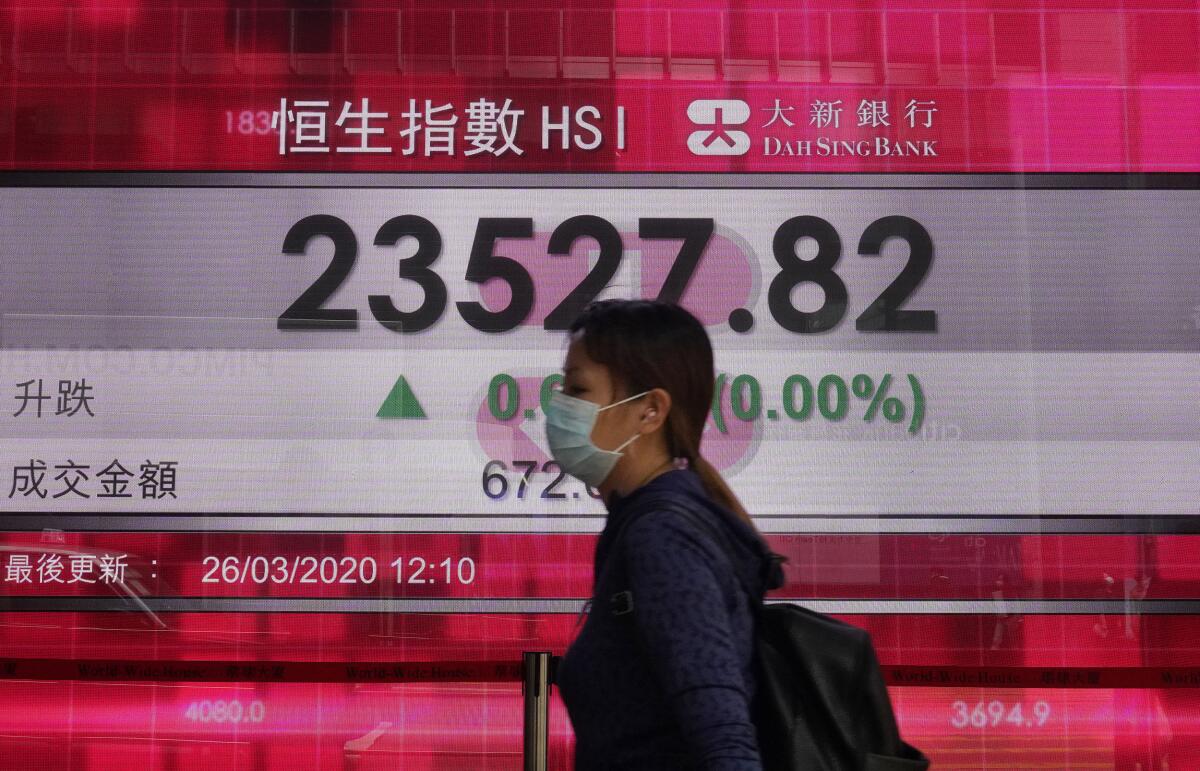Global stocks lower after U.S. Senate approves virus aid

BEIJING — Global stock markets and U.S. futures declined Thursday after the U.S. Senate approved a proposed $2.2-trillion virus aid package following a delay over its details and sent the measure to the House of Representatives.
London and Frankfurt opened down more than 2% while Tokyo lost 4.5%. Shanghai and Hong Kong also declined.
On Wall Street, the future for the benchmark S&P 500 index lost 1.6% after the Senate approved aid late Wednesday to blunt the impact of business shutdowns due to the coronavirus that has killed more than 21,000 people worldwide. The measure goes to the House, which is expected to approve it Friday.
“Investors now have to judge whether tremendous policy support is sufficient to meet worsening economic conditions,” said Stephen Innes of AxiCorp. in a report.
The future for the Dow Jones Industrial Average was 1.3% lower ahead of government report Thursday that forecasters expect to show a record number of Americans filed for unemployment benefits following a wave of layoffs.
The S&P 500 rose 1.2% on Wednesday but is down nearly 27% from its peak a month ago.
The Senate vote was delayed by arguments over whether the measure does too much or too little for companies, workers and healthcare systems. Forecasters say a recession looks increasingly inevitable.
The delay “brings about a wait-and-see tone for markets,” said Jingyi Pan of IG in a report issued before the Senate approval.
In early trading, London’s FTSE 100 lost 2% to 5,548.02 and Frankfurt’s DAX shed 1.8% to 9,699.19. The CAC 40 in France retreated 2.3% to 4,330.67.
In Asia, the Nikkei 225 in Tokyo declined to 18,664.60 while Hong Kong’s Hang Seng shed 0.7% to 23,352.34. The Shanghai Composite Index declined 0.6% to 2,764.91.
The Kospi in Seoul lost 1.1% to 1,686.24 while Sydney’s S&P-ASX 200 added 2.3% to 5,113.30.
India’s Sensex gained 3% to 29,407.25 and New Zealand gained 4%. Jakarta rose 10.2% and other Southeast Asian markets also advanced.
Singapore’s benchmark lost 1% after a government forecast the economy will shrink 10.6% in the current quarter compared with the three months ending in December. Singapore is preparing its second stimulus package as more businesses are told close and controls on public activity are tightened.
Global stock prices have swung wildly as business shutdowns spread around the world. Investors say they need to see a decline in numbers of new coronavirus infections before prices can bottom out.
Many traders have “reverted to the 2008 case study,” when markets saw several 5% rallies during the global financial crisis before bottoming out in March 2009, Chris Weston of Pepperstone said in a report.
An early rally Wednesday on Wall Street faded as disagreements over its details blocked a congressional vote.
Republican Sens. Tim Scott, Ben Sasse and Lindsey Graham demanded changes to ensure laid-off workers don’t receive more money than they did while working. Sen. Bernie Sanders said he would block the bill unless the conservatives dropped their objections.
Even optimists say the package provides just the second of three legs the markets need to regain lasting confidence.
Global central banks already have cut interest rates and injected money into financial markets.
Investors are waiting to see the details of Washington’s plan. It includes direct payments to most Americans and aid for hard-hit industries.
The number of known infections has leaped past 450,000 people worldwide, according to Johns Hopkins University. Overall, more than 112,000 have recovered.
In energy markets, benchmark U.S. crude lost 54 cents to $23.95 per barrel in electronic trading on the New York Mercantile Exchange. The contract rose 48 cents on Wednesday to close at $24.49. Brent crude, used to price international oils, declined 53 cents to $29.46 per barrel in London. It rose 24 cents the previous session to $29.99 a barrel.
The dollar declined to 109.96 yen from Wednesday’s 111.20. The euro gained to $1.0943 from $1.0880.
More to Read
Inside the business of entertainment
The Wide Shot brings you news, analysis and insights on everything from streaming wars to production — and what it all means for the future.
You may occasionally receive promotional content from the Los Angeles Times.










